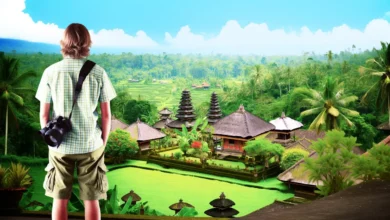
Lombok Cultural Etiquette for Sustainable Travel
Exploring Lombok is not just about enjoying its stunning beaches and majestic Rinjani volcano; it’s also about embracing the local culture with respect. “Lombok Cultural Etiquette” plays a crucial role in sustainable travel, ensuring visitors can appreciate the island’s traditions while minimizing their impact on the environment. By understanding and adhering to local customs, travelers contribute to preserving Lombok’s cultural heritage. This journey of cultural respect and environmental responsibility enhances the travel experience, making it more meaningful and rewarding.
Read Also: Chasing Sunsets at Senggigi Beach Lombok
Understanding Lombok and Its Heritage
Lombok, an island rich in cultural diversity and history, offers more than just picturesque landscapes. Its heritage is a vibrant tapestry of Balinese and Sasak cultures, where ancient traditions are woven into daily life. The island’s architecture, with its unique blend of Hindu and Islamic influences, tells a story of cultural fusion and harmony.
“Lombok’s essence lies in its traditions, where every craft and ceremony tells a story.”
Local handicrafts, such as weaving and pottery, are not only forms of art but also embody the island’s spirit and traditions. Markets in Lombok buzz with artisans selling intricately designed fabrics and ceramics, each piece a reflection of the island’s artistic heritage. These crafts are a testament to the skill and creativity of the Lombok people, preserved through generations.
The Sasak people, making up the majority of Lombok’s population, maintain a strong connection to their roots through traditional music, dance, and rituals. Festivals and ceremonies in Lombok are colorful and vibrant, offering a glimpse into the spiritual and communal life of the locals. These cultural expressions are key to understanding the soul of Lombok and its people.
Essential Local Customs to Know
When visiting Lombok, it’s important to greet people with a smile and a gentle nod, as verbal greetings might not always be exchanged among strangers. This simple gesture of respect can make a big difference in how you’re perceived by the locals. It’s a reflection of the island’s laid-back and friendly culture, where warmth and hospitality are at the heart of social interactions.
Dressing modestly is key, especially when visiting rural areas or religious sites. For both men and women, covering shoulders and knees is not just about following a dress code; it’s a sign of respect towards the local culture and traditions. This practice is particularly important during religious ceremonies or when entering places of worship.
“In Lombok, a smile, modest attire, and gestures of respect bridge worlds.”
Gift giving and receiving are done with both hands or with the right hand, never the left, as it’s considered impolite. This custom is deeply rooted in the local culture, symbolizing respect and appreciation. Whether it’s a small souvenir or a return gesture for hospitality, this practice enhances the mutual respect between guests and hosts.
Read Also: Ultimate Guide to Things to Do in Sanur Bali
Interacting Respectfully with Locals
Interacting with the people of Lombok requires an understanding of their polite and reserved nature. A friendly, yet unintrusive approach is appreciated, allowing for genuine connections to be formed. It’s important to listen more and speak less, showing interest in their culture and lifestyle without being overly familiar.
“Respect in interaction opens doors to Lombok’s heart and homes.”
Asking for permission before taking photos of people or their property is essential. This not only shows respect but also acknowledges their privacy and personal space. Many locals are happy to share their culture with visitors, but it’s crucial to approach these interactions with sensitivity and courtesy.
When invited into a local’s home, it’s customary to remove your shoes before entering, reflecting the cleanliness and sanctity of their living space. Accepting offered food or drink, even if only a small amount, is a gesture of respect and gratitude for their hospitality. These small acts of consideration are key to building trust and friendship.
Read Also: Rinjani Trekking Price Guide Your Next Adventure
Appropriate Dress and Behavior on the Island
Dressing appropriately in Lombok means choosing attire that is both respectful and suitable for the tropical climate. Lightweight, modest clothing not only helps to blend in with the local customs but also provides comfort in the heat. For both men and women, this typically means avoiding overly revealing outfits, especially when visiting villages or religious sites.
Behavior on the island should be as considerate as the dress code. Public displays of affection, for example, are frowned upon, especially in more conservative areas. It’s also wise to speak softly and avoid loud, boisterous behavior, as this can be seen as disrespectful and disruptive in the peaceful, serene environment of Lombok.
“Dress modestly, act kindly, and embrace the serene pace of Lombok.”
In terms of social etiquette, it’s important to show patience and understanding. Things may move at a slower pace than what you’re used to, reflecting the island’s laid-back lifestyle. Embracing this rhythm can enhance your experience, allowing you to connect more deeply with the place and its people.
Read Also: Dress Code Guide for Uluwatu Temple Visits
Insights into Local Ceremonies and Traditions
Lombok is home to a rich tapestry of ceremonies and traditions that are deeply ingrained in the local culture. From the Bau Nyale festival, which celebrates the annual appearance of sea worms and is linked to a local legend, to the Sasak wedding ceremonies, each event is a vibrant display of community and spirituality. These occasions offer a unique window into the values and beliefs of the island’s people.
“Local ceremonies in Lombok reveal the island’s soul and communal bonds.”
Participating in or observing these local ceremonies is a privilege that should be approached with respect and sensitivity. Visitors are often welcomed, but it’s important to follow local guidelines, such as wearing appropriate attire and observing from a respectful distance. Engaging with these traditions allows for a deeper understanding of the island’s cultural fabric.
The Sasak people also celebrate harvest festivals and other seasonal events that connect them to their agrarian roots. These festivals are not only significant for their cultural value but also for their role in uniting communities. They serve as a reminder of the island’s dependence on nature and the cycles of life.
Read Also: Exploring Bali Local Dialects and Languages
Supporting Lomboks Environmental Sustainability
Sustainable travel in Lombok is about more than just enjoying its natural beauty; it’s about actively contributing to the preservation of its environment. Tourists can make a positive impact by choosing eco-friendly accommodations, supporting businesses that prioritize sustainability, and participating in conservation efforts. These actions not only reduce the ecological footprint but also enhance the visitor experience.
Responsible waste management is crucial on the island. Visitors should minimize their use of plastic, especially single-use items, and ensure that they dispose of waste properly. Engaging in clean-up activities, whether independently or as part of organized events, helps maintain the pristine nature of Lombok’s beaches and natural sites.
“In Lombok, every sustainable choice helps preserve its natural paradise.”
Supporting local agriculture and fisheries also contributes to environmental sustainability. By choosing to eat at restaurants that source ingredients locally, travelers can reduce the carbon footprint associated with food transportation and support the local economy. This approach fosters a closer connection to the land and its produce.
Read Also: Sleman’s Enchanting Natural Root Bridge
Enhancing Your Travel Experience in Lombok
To truly enhance your travel experience in Lombok, immerse yourself in the local lifestyle and rhythms. Slow down and take the time to observe and participate in daily activities, whether it’s a morning market visit or a traditional cooking class. This approach not only provides a richer travel experience but also fosters a deeper connection with the local community.
“In Lombok, true discovery lies in connecting with its land and people.”
Exploring the island’s diverse landscapes, from the stunning beaches to the lush interior and majestic Mount Rinjani, offers a chance to appreciate its natural beauty firsthand. Opting for eco-friendly tours and activities, such as hiking with local guides or snorkeling in protected areas, ensures that your adventures contribute positively to the environment and local economy.
Building relationships with locals can transform a simple trip into a memorable journey. Engage in conversations, learn from the residents, and share stories to gain insights that are not found in guidebooks. These personal connections can lead to unexpected discoveries and enriching experiences.
Read Also: Purwakarta Lake Camping Ultimate Getaway

Sustainable travel in Lombok is more than just a way to explore; it’s a journey into the heart of its culture and natural splendor. By embracing local customs, participating in traditional ceremonies, and respecting the environment, travelers can truly enhance their experience. Lombok offers a unique opportunity to connect with a land that balances modernity with tradition, and sustainability with beauty. Through mindful practices and genuine interactions, visitors contribute to the preservation of this island’s heritage and environment. In essence, sustainable travel here is about forming a deep, respectful bond with both the people and the place, ensuring that Lombok remains a vibrant and welcoming destination for generations to come.








Hello,
recently I found a brand with a very concerned vision about modest fashion and they start with Abayas. They have plans to expand by adding more apparel with multiple categories and the best thing I like is they are working on a collaboration economy which I appreciate the most. This means the opportunity for every individual affiliate to the modest apparel industry like designers, producers, stylists, investors, etc. This new brand name is Siyah Aks and the site address is siyahaks.pk